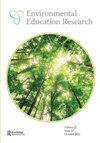School students’ attitudes towards unloved biodiversity: insights from a citizen science project about urban rats
IF 3.1
3区 教育学
Q1 EDUCATION & EDUCATIONAL RESEARCH
引用次数: 2
Abstract
Abstract Most of biodiversity is not considered charismatic and from human’s perspective it can be indifferent, problematic, harmful, disgusting, or dangerous. Secondary school students’ attitudes towards an unloved species and how it relates to their feelings of disgust in the context of a biology course were studied during a citizen science project where Finnish secondary school students surveyed the occurrence of urban rats. Questionnaire data were collected on four scales: attitude towards rats, interest in learning about environment, disgust, and liking biology as a school subject. It was modeled with an item response theory approach by including respondents’ age and gender. Higher age correlated with a more positive attitude towards the environment and lower level of disgust. Surprisingly, the students with more positive attitude towards rats also not only had a higher liking biology as a school subject and positive attitude towards the environment, but also a higher level of general disgust. The results suggest that disgust in general is not detrimental in learning and appreciating unloved others as parts of biodiversity. The results also raise questions on how personal attitudes towards the individual species relate to attitudes toward more abstract concept of biodiversity or the environment.中学生对不受欢迎的生物多样性的态度:来自一个关于城市老鼠的公民科学项目的见解
摘要大多数生物多样性并不被认为是有魅力的,从人类的角度来看,它可能是冷漠的、有问题的、有害的、恶心的或危险的。在一个公民科学项目中,芬兰中学生调查了城市老鼠的发生情况,研究了中学生对一个不受欢迎的物种的态度,以及它与他们在生物学课程中的厌恶感之间的关系。问卷数据按四个量表收集:对老鼠的态度、对学习环境的兴趣、厌恶和喜欢将生物学作为学校科目。它采用项目反应理论方法建模,包括受访者的年龄和性别。年龄越大,对环境的态度越积极,厌恶程度越低。令人惊讶的是,对老鼠态度更积极的学生不仅更喜欢生物学作为一门学校科目,对环境持积极态度,而且普遍厌恶程度也更高。研究结果表明,作为生物多样性的一部分,厌恶在学习和欣赏不被爱的人时通常是无害的。研究结果还提出了一个问题,即个人对单个物种的态度与对更抽象的生物多样性或环境概念的态度之间有何关系。
本文章由计算机程序翻译,如有差异,请以英文原文为准。
求助全文
约1分钟内获得全文
求助全文

 求助内容:
求助内容: 应助结果提醒方式:
应助结果提醒方式:


